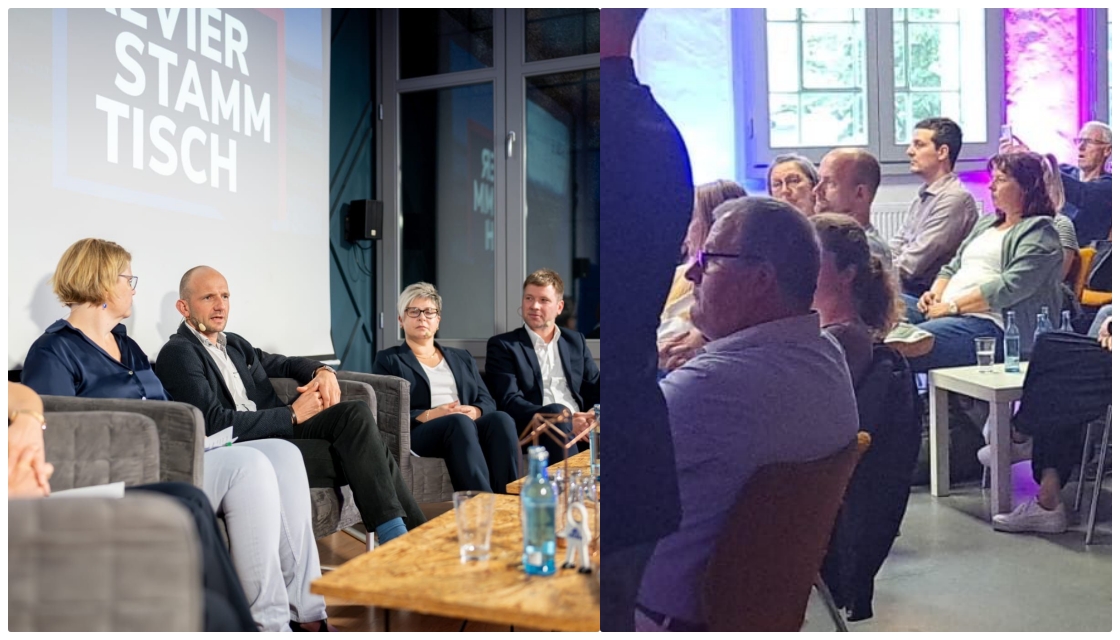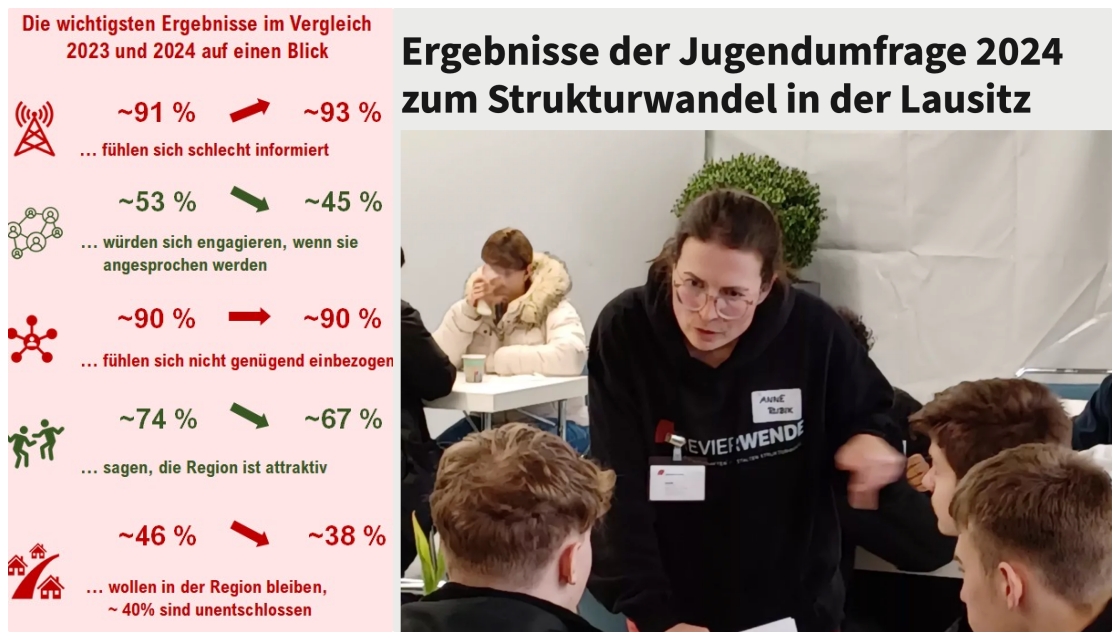structural development
Findings from the District School & Structural Change District Table
- structural development
- Hits: 434

Schools and structural change – How do we reach young people? A personal report about the SAS district meeting on one of the most important topics in the structural change discussion.
by Jasna Zajček
For almost four years, as part of my work for the task force making understandable and accessible to all citizens of the Görlitz district We publish texts, press releases, give interviews , place advertisements, and report almost daily in a specially created blog about the small and large developments in our beautiful district of Görlitz, which is facing major changes as a result of the coal phase-out. I attach great importance to conveying the topic in a language that everyone understands, regardless of their previous knowledge or level of education. team, we also attach great importance to emphasizing the opportunities that are opening up for the people of the region, especially the youth. Today no one has to leave Lusatia (as was unfortunately the case in the 1990s) in order to lead a good life or even find work. On the contrary: in addition to vacancies, we have so many things here that city dwellers can only dream of. Beautiful nature, affordable rents, the chance of home ownership, parking spaces and yes - also good jobs. The number of which is constantly increasing with the establishment of large research institutions such as the DZA , administrative institutions and new establishments. It is not for nothing that the Görlitz district is also Priceless Land - in reference to the high quality of life.
We inform everyone - including young people
Of course, we also publish our efforts and successes in specialist magazines such as Lausitz Magazin or Neue Lausitz , the business magazine Saxony and also in our publicly accessible annual report . I am also available at any time for the daily press such as the Lausitzer Rundschau and the Sächsische Zeitung the Wochenkurier , the most widely circulated (weekly) newspaper in the Görlitz district with a circulation of 102,000 copies and low-threshold about the developments and funding decisions, about our citizen participation formats, workshops, conferences, and, most of all, about the "groundbreakings" - the moments in which, for example, communities receive their funding checks and the development becomes tangible.
These are the best moments for my team in the ENO Structural Change Task Force, because a "groundbreaking ceremony" such as the one at the Lausitz stop in Kodersdorf is preceded by months and years of feasibility checks, studying funding guidelines, long meetings and consultations and finally complex application beforehand. Our work is designed for the long term - we are all the more pleased when a project gets started - which is often preceded by the forging of new alliances, not even a quick matter. It's not that we lack work - but our committed colleagues still take the time to go to schools, be present at trade fairs such as the INISDERTREF and educate themselves in order to encourage youth-friendly and low-threshold enthusiasm for the changes .

Click here for the complete youth survey on structural change in Lusatia
, at the recent " Revierstammtisch im Lausitzer Revier | Topic: Structural change and schools - is that right? SAS at the Telux in Weißwasser, it became clear once again how challenging it is to inform young people in particular and to support this important topic sensitize.
The regulars' table was dedicated to the relationship between schools and structural change - an extremely relevant debate. While on the one hand we talk about how to bring structural change closer to children and young people, schools and teachers face completely different challenges. Keyword: shortage of teachers - even if our service point Unbezahlbarland is trying to address this with innovative measures , there is still a long way to go.
Many participants at the regulars' table asked themselves to what extent the schools themselves could benefit from structural change. The desire for additional support, particularly in the form of human and financial resources, was clearly expressed by teachers and even by after-school teachers present. But the reality is sobering: the necessary resources to relieve everyday school life and at the same time convey innovative learning content on this topic, which will concern the entire region for a long time, simply do not exist.
A central concern of the evening was the question of how we can make it clear to young people that structural change does not have to be associated with profound disruptions and negative consequences, as was the case in the 1990s. Instead, it offers enormous opportunities that need to be recognized and exploited, as District Administrator Dr. Stephan Meyer made clear on the podium.
But how do we convey this perspective when many adults already lack an understanding of the dimensions and potential of structural change, despite constant publications and information events on the topic?
As trade unionist Marko Schmidt from the DGB project “ Revierwende ” emphasized, according to surveys, up to 90 percent of young people do not know what the term “structural change” even means. This knowledge deficit is alarming and shows that we need to intensify our information work.
There are definitely projects and approaches that could reach young people. For example, we from the ENO structural change task force went to schools and were able to provide information about the topic using a method box. Afterwards - according to the clear feedback - the students were happy about the enormous gain in knowledge on this important topic. And to their future in one of the regions in Germany in which many billions are being invested as part of the coal phase-out and where the future is focused on renewable energies and research . Ideally, we will also become a “ Net Zero Valley ” model region, which would bring with it completely different, huge opportunities for the economy and employees in the Görlitz district.
On behalf of the district, the ENO regularly organizes the INSIDERTREFF educational fair with the Education Service, creates the INSIDER Atlas and many other educational products and events in order to raise awareness among young people about training and their own future in the region, also from the perspective of structural change to spread more widely. But despite these efforts, as was particularly mentioned by those present from the teaching company, the impression remains that we all reach young people too rarely. There is often a lack of the right access. The schools are important partners in this, but as the head of the Landau-Gymnasium in Weißwasser, Mike Brill, emphasized, they have to contend with completely different problems: a shortage of teachers, rigid curricula and preparation for central exams take up a lot of space. There is a lack of freedom here to integrate new topics such as structural change into lessons.
This is particularly unfortunate, because as the deputy head of the training center for teaching at high schools, Doris Kästner from the Dresden State Office for Schools and Education , emphasized at the regulars' table, children and young people need one thing above all in these times: confidence. They should have the feeling that they can actively shape the future. Curiosity, willingness to experiment and an open culture of error should be encouraged in order to prepare them for the challenges ahead. But that requires time, courage and flexibility, and that's exactly what many schools are currently lacking.
Hope and positive approaches: rural areas in particular score points
However, there are also positive approaches: Young teachers, reported Annekathrin Geißler, who trains teachers herself, are specifically looking for smaller schools, including those in rural areas. Schools where they have creative freedom and can contribute their ideas.
This creativity and openness could be the key to seeing structural change as an opportunity and integrating it into everyday school life. But for this to happen, the framework conditions must be improved. Only if teachers are supported and relieved of their burden can they create the necessary freedom for innovative projects.
Public relations and participation concepts are not enough
One thing became particularly clear at the regulars' table in Weißwasser: There are already numerous concepts for public relations and youth participation. But that alone doesn't seem to be enough. We must continue to actively involve young people more intensively, listen to them and let them feel that their ideas and their future play a central role in structural change. Our citizen participation format “Lausitz Café” with its varied topics and publicly visible results is, for example, a format in which everyone can understand what can emerge from their ideas . As a task force, we always invite people on all channels - especially the youth-relevant Instagram - and provide detailed .
However, only if all actors and stakeholders intensify the dialogue with young people can we prevent the change from passing them by - or from not even noticing the development on their doorstep. That was the tenor of all those discussing in the almost full Telux Hafenstube in Weißwasser.
The challenge remains great. But I am convinced that we can achieve a lot with committed, targeted and, above all, understandable communication. It is up to all of us - politics, schools, business and society - to create the conditions so that structural change is not perceived as a threat, but as an opportunity. Personally, I have long preferred to use the word "structural development" rather than "change", because "change" not only reflects the bad memory of the 1990s and the machinations of the Treuhand, but also capitulation to fate, which one has to submit to. But the opposite is the case! framing for once .
Today's youth must feel empowered to actively shape this change. This is the only way we will be able to transform the region in a sustainable and future-oriented manner. In the end, all experts and interested guests were sure of this.
We'll stay tuned - and keep you updated here. Let's see each other at our 10th Lausitz Café on October 10th. on the subject: "Achieve more together - your commitment is priceless?" and feel free to write to us if you have your own ideas for the development of our beautiful region. And of course I would be personally happy if you would talk to me about this
Best regards!
Her

